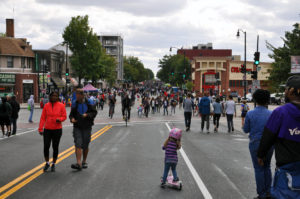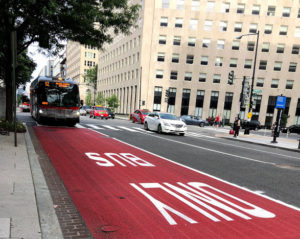Category: Emails

ACTION: Tell Maryland to delay the I-495/I-270 widening project until after environmental reviews!
As you’ve probably heard, the Maryland Department of Transportation (MDOT) plans to expand the Capital Beltway (I-495) and I-270 by adding toll lanes, and now wants to accelerate the project by passing amendments through the Maryland Board of Public Works.
Email Maryland’s Board of Public Works members today!
We don’t think this project should more forward until there has been a comprehensive alternatives and impact analysis under the National Envrionmental Policy Act (NEPA). Rushing the highway expansions and failing to complete the environmental review process first creates significant environmental, legal, and financial risks.
As the Virginia experience has shown, the 12-lane highways that result from adding four toll lanes are a massive, generational alteration of our landscape and come at high cost to homes and neighborhoods, people and health, and the natural environment. Maryland has committed to reducing greenhouse gas emissions, yet toll lanes will increase driving and emissions.
Image: urbandispute, Flickr
ALERT: We won! Yesterday, the DC Council voted for a more inclusive city!
ALERT: We won! DC Comprehensive Plan will help build a more inclusive city!

Yesterday, Oct. 9, 2019, after many delays, the DC Council voted on the Framework Element of the Comprehensive Plan, the guiding document that will shape our city for years to come.
With your help, we fought for and won two key amendments. The first prioritizes preserving and building more affordable housing, and preventing the displacement of residents. The second fixes the broken review process for Planned Unit Developments (PUDs) so it can be predictable, while also prioritizing affordable housing and preventing displacement.
These changes go a long way towards making the District more inclusive!
Take a moment to thank the DC Council!
What happened? Over the last few months we partnered with other housing advocacy groups, sent alerts to you at key points, met with Councilmembers and staff, and explained the issues to the media. With your help we were able to win two critical amendments:
- Councilmember Brianne Nadeau’s amendment which helps address racial and social equity in DC by explicitly prioritizing affordable housing and prevention of displacement.
- An amendment removing exclusionary language which made preserving “physical and visual character” a dominating requirement in development review. This language was too similar to the type of planning language that has historically perpetuated housing segregation. The Council replaced it with language suggested by the DC Office of Planning, which we supported.
We thank Chairman Mendelson and the Council, who heard us and made the revisions we knew were critical to a better plan. Thanks to these changes, well-designed affordable housing and mixed-income housing proposals will be able to move forward again.
Please be sure to thank the DC Council!
We’re excited to get to work reviewing and supporting good projects. Meanwhile, the rest of the Comp Plan chapters will be coming forward soon. Look for more updates from the CSG team!
We hope you will stay involved, helping to shape land use and housing policies and decisions to ensure our city is a place where longtime residents can stay and thrive, and newcomers can find new opportunities.
Background to the critical Comprehensive Plan amendments
The 2006 Comprehensive Plan focused too much on preserving the status quo rather than planning for a growing population and the need for more housing that is affordable to middle and lower-income residents. Opponents of new housing have used the 2006 Comprehensive Plan to delay thousands of new homes, and hundreds of new affordable homes — increasing rather than reducing displacement of longtime residents.
That’s why we developed dozens of amendments, and also partnered with other organizations to craft and submit numerous amendments to the Comprehensive Plan, provided testimony at the March 2018 hearing, and why you sent in hundreds of emails to the Council last year.
On July 10, 2019, the DC Council took a preliminary vote on the Framework Element of Comprehensive Plan bill proposed by Chairman Phil Mendelson. While the Chairman’s bill included a significant number of our amendments, as well as the Office of Planning’s amendments, the Chairman’s revised bill still fell short in addressing the need for more affordable housing.
As a result of strong advocacy to the Chairman and the Council by the Coalition for Smarter Growth, our active supporters, and our partners in the DC Housing Priorities Coalition, the DC Council voted for an amended Bill 23-1 on October 8, 2019. Amendments we won:
- Specific guidance to prioritize affordable housing and preventing displacement in the Planned Unit Development (PUD) approval process (section 224.9).
- Removal of exclusionary language about “physical and visual character” in the Planned Unit Development approval process, which would have made this “character” more important than any of our other values like preventing displacement and building more affordable housing. The Council supported alternative language recommended by DC Office of Planning, which we supported (section 227.2).
Learn more about the amendments in the CSG blog post: DC Office of Planning and advocates seek to change troubling provision in DC Comprehensive Plan bill

The DC Comp Plan is back – let’s ensure it allows for a more inclusive city
Together with you, we’ve pressed for over two years for an updated Comprehensive Plan that makes building more affordable housing a priority for the city. But for more than a year, the guiding first chapter or “Framework Element” has been bottled up in the DC Council. Finally, the second and crucial vote on the bill will be September 17.
While the Chairman’s revisions incorporate many of the amendments we supported, it falls short of establishing affordable housing as our top priority, and doesn’t ensure that enough housing can be built across the whole city.
Send a message to the DC Council today and let them know we want a city for all.
Tell the DC Council the Comprehensive Plan must:
- Directly address the city’s need for more housing, especially near transit, so that people across the income spectrum can have more choices about where they can live;
- Make affordable housing the highest priority throughout the document, and in the development review process;
- Commit to preserving existing affordable housing and prevent residents from being displaced;
- Enable new affordable housing to be built across the city, including in Upper Northwest, where for too long some of its residents have blocked significant numbers of new homes from being built;
- Fix the broken development approval process (including Planned Unit Developments), ensuring that affordable housing is given top priority, and that the process is predictable for those who participate in good-faith.
In our meetings with Councilmembers over the past few months we’ve pressed the case and believe there is significant support.
Photo credit: Ted Eytan, https://www.flickr.com/
8.7.19 Summer Email Updates
CSG in action-District of Columbia
Parking Cashout – we need one more vote to make this happen!
If your employer offers you a parking benefit, we think you should have the option to cash it out and put the funds toward your biking, walking or bus/Metro commute. Unfortunately, our bill is stuck in the D.C. Council’s Transportation & Environment Committee. Contact Councilmembers Brandon Todd and Kenyan McDuffie and let them know you support B23-148, the Transportation Benefits Equity Act of 2019. Check out our factsheet here, and our webpage here.
The DC Comprehensive Plan – let’s ensure it supports a more inclusive city.
For two years, we’ve been pressing for an updated citywide Comprehensive Plan that ensures we’ll have enough homes and affordable homes as our city grows. On July 9th, the DC Council took a first crucial vote on the Plan. While it has some of the improvements we’ve fought for, it still falls short of building a truly inclusive and sustainable DC. We’ll need you to continue to weigh in. Here’s our call to action outlining priorities for the Plan.
DC Bus Report Card — we can do better!
We recently teamed with MetroHero to issue the first-ever DC Metrobus Report Card. We graded 9 high-ridership bus corridors on speed, schedule adherence, and headway adherence. Find out how these routes scored (spoiler: expect more F’s than A’s) and check out the solutions we’re promoting to make our buses faster, more frequent and more reliable.
Making DC’s Buses the Best: A forum on the first performance-based D.C. Bus Report Card and next steps for faster, more reliable bus service for all.
Join us for the release of the first D.C. Bus Report Card. A short presentation will be followed by an interactive discussion with leading decision-makers, transit experts, and advocates sharing ideas on how to make D.C.’s bus system the best way to travel on city streets.
WHEN: July 10, 2019, 6:30-8:30 pm
WHERE: Georgetown University’s Downtown Campus, 640 Massachusetts Ave NW, Washington, D.C.
There is no charge to attend this event, but pre-registration is required.
Representatives from the Coalition for Smarter Growth and Metro Hero will present the results of the first ever performance- based report card for D.C. buses and a panel of local experts will discuss how this assessment ties in with other studies being done to improve the bus. The panel will include Councilmember Mary Cheh, DDOT Director Jeff Marootian, and representatives from WMATA, TransitCenter, and the Greater Washington Partnership. Uwe Brandes, of the Georgetown Urban & Regional Planning Program will moderate.
based report card for D.C. buses and a panel of local experts will discuss how this assessment ties in with other studies being done to improve the bus. The panel will include Councilmember Mary Cheh, DDOT Director Jeff Marootian, and representatives from WMATA, TransitCenter, and the Greater Washington Partnership. Uwe Brandes, of the Georgetown Urban & Regional Planning Program will moderate.
Join us on July 10 to learn about new ideas and next steps to improve bus service in the District and hear updates on current projects at DC Department of Transportation and Metro! Through this discussion, we hope to inspire public involvement and support for the best possible bus service in the District of Columbia and the National Capital Region.
Co-hosted by: Coalition for Smarter Growth, MetroHero and Georgetown SCS Urban & Regional Planning Program
photo credit: Cheryl Cort
